#are anti consumerist movements
Explore tagged Tumblr posts
Text
everytime i see ppl say that ‘fight club is satirizing/criticizing toxic masculinity, Actually’ i am like. PLEASE put on your big boy thinking caps and watch it again
#also it’s not anti capitalist it’s anti consumerist. which is significantly different#there is just sooooo much cultural context informing what that film had to say about men it is Not as simple as Masculinity Good/Bad#i only read like half the book and then got distracted and the audiobook returned to the library but i WILL finish it eventually#like i very much want to read it to have a more full understanding of the whole thing#bc i do think there’s an argument to be made for a satirical element in the book more so than the film#but idk man look at anything chuck palahniuk has ever said and tell me if he’s concerned about toxic masculinity#the fetishization and worship of violent masculinity in fight club is like. so sincere.#listened to a podcast sometime this past year that briefly discussed the mythopoetic men’s movement and all i could think was#oh so THIS is the moment that fight club came out of. like that was what made me Understand fight club#sorry i lovehate fight club so much i say the same thing about it every few months#r.txt
5 notes
·
View notes
Text
kind of hate actual lifestyle movements that get co-opted into an aesthetic. like. minimalism, zero-waste, veganism, witchcraft, etc. they all are basically free ways to live life more simply. but all these corporations and influencers co-opted the movements and made them fucking aesthetics to be packaged and sold.
only buying what you need/really want is minimalism, but no, you need to make your house looked stripped down and ugly and beige to be a True Minimalist. a PBJ is vegan. but no, you need sunflower seed butter and special chia seed jam and sprouted bread to be a True Vegan. re-using your plastic tupperware grandma gave you is literally zero-waste, but no, you need NO PLASTIC WHATSOEVER OR YOULL GO TO ZERO WASTE HELL. Most witchcraft spells can be used with items from around the house, but no you need like 30 crystals, exotic herbs, and several tarot card sets to be a True Witch.
Honestly, it disgusts me. The whole point of these lifestyles is to be anti-consumerist, anti-status quo, anti-industrial. The whole point is to be pro-independence, pro-earth, pro-humanity, pro-animal. But regardless, the capitalist greed machine never stops. Shouldn't be surprised because even holy days like Christmas or Samhain (Halloween) they make into a marketplace.
#when Jesus spoke of the Den of Thieves this is what he was talking about#using greed to take over things that are suppossed to stand against it#vegan#zero waste#minimalism#witchcraft#lilys crunchy awakening
163 notes
·
View notes
Note
hello I am here to ask what art movements you relate to the dream team
Okay, let's do this! LONG POST! *cracks knuckles* 😤
George
I'm starting with George bc I'm a shameless Golo and he lives in my head like a worm.
I immediately associate George with expressionism. Now, this may seem strange considering his personal aesthetics are very designer streetwear and techwear, which in many way is the opposite of expressionism. However, in a lot of his wardrobe and overall personal tastes, he does have small bits of appreciation for expressionism.
For example, this Supreme shirt of his displays the piece "Reaper" by artist Josh Smith. Josh Smith is a contemporary post-modern artist and not from the original expressionist movement, but his work holds a lot of traits to expressionist artist Edvard Munch. Though I do have criticisms of Supreme and their foundation being in appropriation of Barbara Krueger, taking her anti-consumerist work and messaging to create a consumerism giant, I do admire that they've grown to collaborate, credit, and pay artists through their clothes.


(Josh Smith with Supreme and Edvard Munch)
Expressionism is very broad in style and artistry because it was the movement all about expressing personal taste and emotions through art, rather than capturing scenes as close to reality as possible (impressionism). I shared a post a few days ago about George's precious Discord profile pictures and both of them displayed a broad and vibrant spectrum of color, one being a palette knife piece and the other being a splatter piece. Now, these aren't necessarily expressionism. Like Josh Smith's work, they are post-modernist and abstract contemporary, but the usage of color and freedom in strokes puts them in a similar category.
Now, my final reasoning for George being expressionism is purely just Vincent Van Gogh. I am biased as George is my fave and Van Gogh is my fave, but recently a theory emerged about Van Gogh that he was likely red-green colorblind. When we look at Van Gogh's color palettes. He heavily relies on blues and yellows that fall within the protanopia color spectrum, whereas when he uses greens, reds, and oranges, they are often used as shading for blue and yellow. There are instances where he uses red and green with intention (his self portraits and the painting of his room), but even then when he uses red-green, it is not in a way that follows usual color theory.
It is impossible to know if Van Gogh was actually colorblind or had a color deficiency, but I do think it is a strong theory that supports his art and adds a new layer of perspective to it. Especially considering he was very unsuccessful in his lifetime and his artwork was often considered jarring and not appreciated.
George's color blindness is also fascinating to me, as per his own on stream tests, he has tested both as severe and mild, so unless we had George's vision, we don't realize exactly how much color he truly can see. But in the parasocial box in my mind, I think he would enjoy Van Gogh and expressionism as a whole.
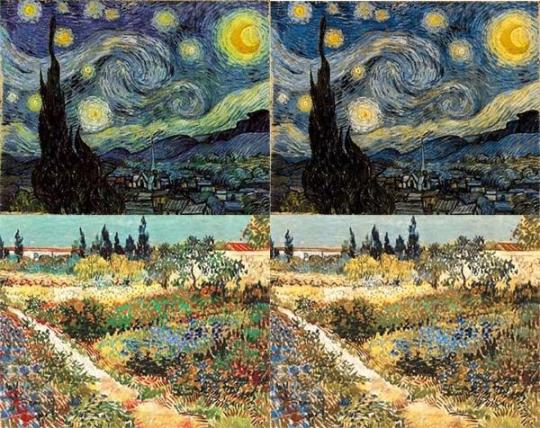
(Vincent Van Gogh, original work left, work with protanopia filter right)
Dream
In my collage post, I mentioned impressionism for Dream, and while I do believe that to an extent, I personally think Dream might fit more into illustration and outsider art.
Illustration is an easy one to talk about because so much of his brand is simplistic and stylized in a very graphic and illustrative way. His very icon, the black and white Microsost paint smiley on the eye straining neon green, is playful, memorable, and recognizable. It's easy to replicate and remember, and through the artists and designers on his merch team, it's able to be reimagined and expanded upon.
For some context, I originally went to school for illustration, but very quickly switched into fine arts, so my knowledge of illustration as an industry is not as deep as it could be, but I know that reproduction and recognition are definitely pushed as important.
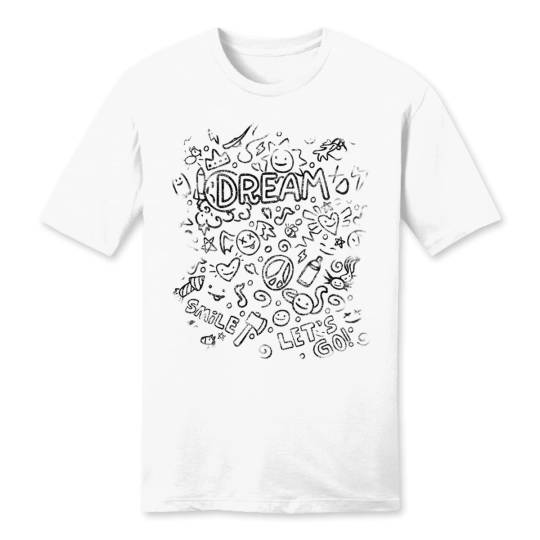

Stepping away from Dream's own branding with illustration, I think there is a strong connection from Dream to outsider art as well.
I am a huge fan of outsider art. I took multiple classes on it.I love outsider music and poetry. It is overall a movement I greatly enjoy. However, as a disclaimer, the origins of outsider art as a movement and category for art are very dubious and unethical. I won't get into all of it here, but when outsider art was initially coined, it was very exploitative of the mentally ill, disabled people, people of color, etc. I think as time has gone on and outsider art and artists alike gained audiences that were more appreciative and good faith, it has transformed into something more wholesome and celebratory.
Dream is a self-made individual. He didn't go into YouTube, content creation, and merchandising with previous learned knowledge. He's very open about being self-taught in most of his skills and endeavors. Outsider art at its core is about the uninitiated and the self-taught pursuing artistic endeavors without the fear or stress of the institution of art.
Daniel Johnston is the most notable artist within outsider music, but he was also a visual artist as well. His work is naive and honest, even when it is hamfisted and fumbled. He is genuine and truthful, but often to a fault. But he grew a cult audience that loved and appreciated him, even through his worst moments.
A little personal interjection, but I am a huge fan of Daniel and his work spoke to me through high school as someone who spent most of my life with undiagnosed autism. His death genuinely shook me and I remember the day he died so vividly that in some ways I'm still grieving. I recommend exploring his music with my whole chest, even if it may not be to your taste.
I do think in the modern world, a lot of people drawn to outsider art and the act of being self-taught in fields of interest are neurodivergent. Dream has been very open about having ADHD, and even mentioned possibly being on the [autism] spectrum (though that question was asked in a very invasive way, so I take Dream's answer with a grain of salt). I think that adds another level of connection/relation to outsider art.
I could go on and on about outsider art and how amorphous it's definitions have become, but I'll stop there for now.
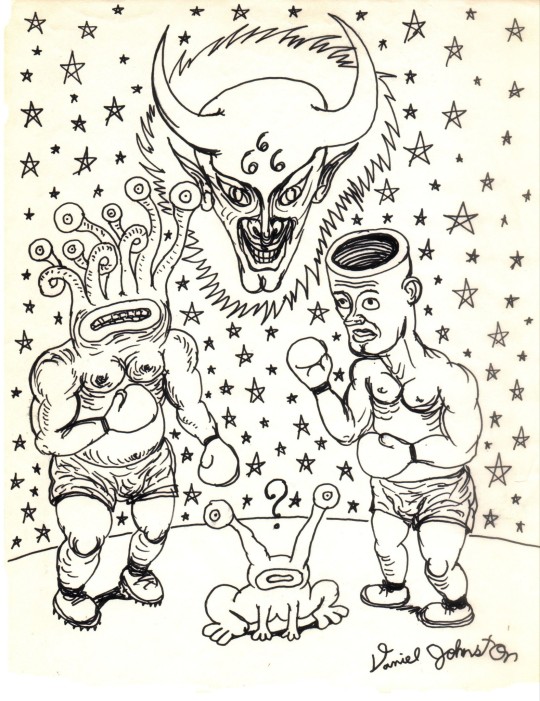
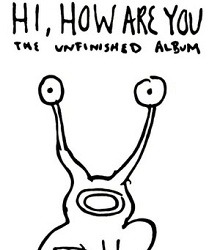
(Works of Daniel Johnston)
Sapnap
In my opinion, I think Sapnap is the most open about his interests and personal aesthetics. Even if it's not a direct comment on it, he has the most furnished and decorated office, he has a clear and consistent sense of style with favored brands and imagery, and he's a big fan of anime and adult animation. He also advertises the most out of the Dream Team, so, like, get the bag, but also I'm going to tease him with art movements that directly comment on consumerism and advertisement.
Right away, I think appropriation and pop art.
Appropriation can be a scary word as we often hear it in the context of theft or bigotry. Even within the world of art, appropriation is a touchy subject as we try to define what is transformative appropriation and what is plagiarism, reference back to Supreme and Barabara Krueger.
I actually saw a Barbara Krueger show in real life, and it was nothing short of breathtaking. It was overwhelming and in your face. It was uncomfortable and eye-opening. It both meant nothing and everything as you were faced with false advertisements, bold statements, and consumerist culture.
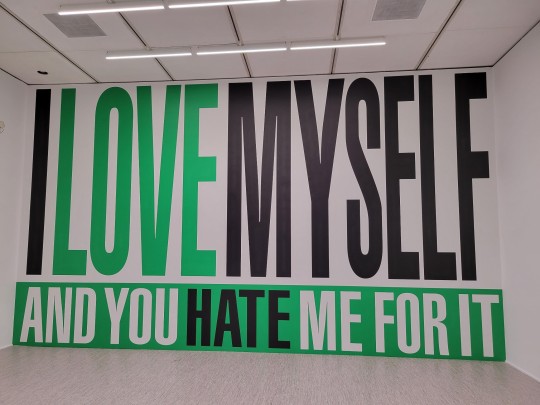
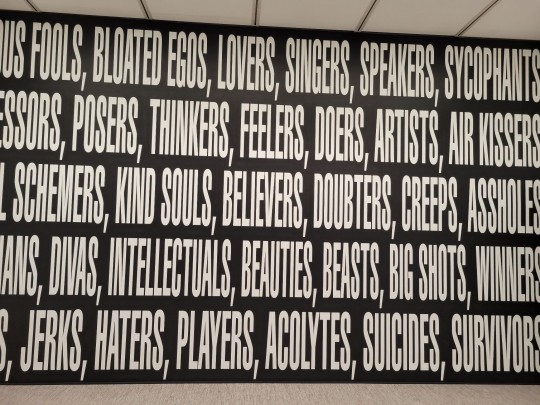
(Barbara Krueger at the Art Institute of Chicago, 2021)
The biggest name in pop art is Andy Warhol, and when it comes to Warhol, you either hate him or you love him. The man is surrounded by controversies, both good and bad, but I won't deny his influence on contemporary art. I think his bold colors, high contrast, and play on reproduction in art all fit Sapnap's personal aesthetics, similar to Dream with illustration. But in more modern pop art, I think a lot about my friend and colleague David Hernandez. David's art is provocative and at times uncomfortable, but he uses a lot of ideas and concepts from pop art and appropriation to appeal to a more modern audience, playing into nostalgia growing up in the age of the internet in a way that is reactionary. His work can be very NSFW and outright gooner brained, so if you do seek out his art, be warned of that nature. Still, his skill is insane because he uses acrylic, oil, and spray paint to make pieces that feel as if they were done digitally.

(David Hernandez)
I hope these make sense, and maybe you even found a new artist/art movement to enjoy! I do think there is flexibility within these and plenty of other movements and artists that fit these creators (like impressionism with Dream even though I didn't include it), but these stand out to me the most as fitting their identities and personal aesthetics and interests.
If anyone has more they want to add or discuss, please reblog and/or comment because I would love to hear from others on this!
#long post LMAO#dtblr#dteamblr#dream team#dreamwastaken#dreamblr#georgenotfound#gnf#404blr#sapnap#pandasblr#art#art talk#we just got a letter
52 notes
·
View notes
Text
We Like, Are Totally Spies
When we think about shows that will appeal to boys. Action is the easiest to relate. Something like; Ben 10, American Dragon Jake Long, Avatar: The Last Airbender, and Justice League will be on the list. It has drama, it has fights and it's cool!
However, there has been a movement in that era where specific cartoon shows aim to get girls into action. Kim Possible, Juniper Lee, My Life as a Teenage Robot, and The Winx Club are perfect examples of such shows.
There is an odd case for more girl-centric shows. Something about the need to balance femininity with action. The show needs to feel like an action that happens to have the main characters be girls. This is where today's topic comes in. We're talking about how;
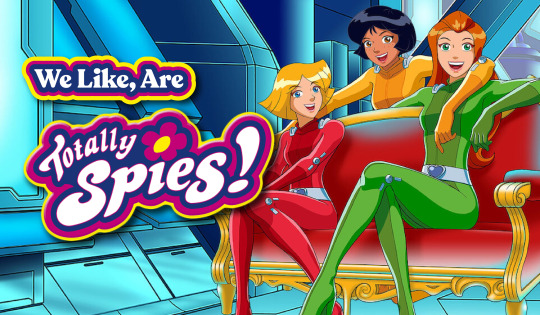
- How's the Mission, Spies? -
< Totally Spies > by Vincent Chalvon-Demersay and David Michel follows three teens; Sam, Clover and Alex from Beverly Hills living a secret life being Super Spies for WOOHP (World Organization Of Human Protection) under their boss; Jerry Lewis.
Their missions involve travelling the world. Fighting mad scientists and twisted outcasts who seek to dominate the world with style and gadgets that conceal themselves as fashionable equipment.

The trio plays specific archetypes. Sam (green) is the brains, Clover (red) is the fashionista/ boy obsessive and Alex (yellow) is the athlete and occasional nerd. Despite their differences, they share several common interests such as their love for shopping and spy skills of agility, hand-to-hand combat and espionage.
Across six seasons, the girls matured from high school to university students. Confronting the daily struggles of homework, social lives and their petty arch-enemy, Mandy.
As a vibe, < Totally Spies > fully leans into the Beverly Hills lifestyle of fabulous fashion and some familiar pop culture names of that era. The show has a mix of the James Bond type of super spy world filled with dull henchmen, high-tech machines and some tacky villains.
- Time to go to Plan B! -
The episodes are condensed into their own episode. Although there have been some arcs that follow specific villains who have a bit of history with the main characters.

Tim Scam is a former agent who went rogue against WOOHP and Terrence Lewis; twin brother to Jerry and a sore thumb to WOOHP. There also reoccurring allies as well. Brittney (cyan) who joined the team as a trainee, Dean from the three-part series < Evil Promotion Much? > and Blaine a freelance agent who dated Clover.
The conflicts, if we can even call them conflicts at all have aged rather strangely. Some of the villains commit petty crimes like kidnapping celebrities due to jealousy or act extreme. Like being anti-consumerist with the solution of destroying malls.
Yet, some are still relatable to this day such as a kid villain who is mad at his father for being busy as a commentary on how parental neglect can cause warped ideas in a child. Whatever, it's a pre-teen show. Let's not look into it too deeply.
The world of Totally Spies is also interconnected with several other shows; [The Amazing Spiez] and [Martin Mystery].

< Martin Mystery > follows Martin, a paranormal investigator for the Center with Martin's step-sister, Diana Lombard and Java the Caveman. Fighting monsters, urban legends and aliens.
According to a special crossover episode. Martin's boss; M.O.M (Mystery Organization Manager) and Jerry know each other. Likewise, in Amazing Spiez; Jerry is also the boss of the Clark siblings. Lee, Marc, Megan and Tony. Sadly, these shows were short-lived and cancelled.

It does raise an interesting point. Why is Totally Spies more popular? As a guess, I think it's because the chemistry between the characters is a lot more interesting and fun.
The three girls are best of friends and while they sometimes bicker over boys, responsibilities and opinions. They will always put their friendship and mission first above all else. It feels more real, in a superficial way.
That an actual girl would have a girlfriend group this tight-knit and if they ever become a part of something bigger than them. They would do it together.

- Here We Go Again! -
Tacky villains, cute super spy girlfriends and awesome gadgets aside. The show has a few good jokes here and there. Its art style borrows a lot from Anime and its colors are groovy to the eyes.
For a show that was meant to attract girls into action. The show has also garnered a large following from boys as well. I think another secret to the success of < Totally Spies > can also be because of its approach to the subject. Like I said in my introduction.
There is an odd case for more girl-centric shows. Something about the need to balance femininity with action. The show needs to feel like an action that happens to have the main characters be girls.

This show is a girl's show. The girls are unapologetic being girly. Doing girl things like shopping, manicure, dating and going on dream vacations but with their secret life as spies. The show balances it out with good action and is still using that girly theme to add to its gadgets.
Heck, some of the gadgets are stuff that I would personally want to have. The Jet Pack backpack, The Wind Tunnel 3000 Tornado Blast Hair Dryer, Lazer lipstick and the Compowder are on my list. Especially with its costume change function.
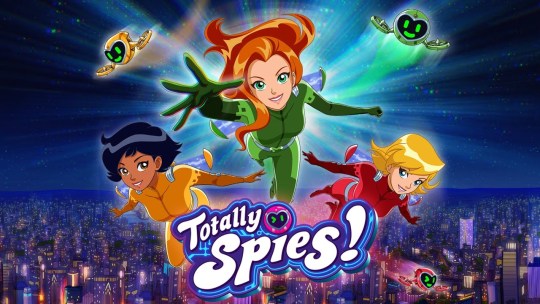
It's a show that embraces both ends of the spectrum and allows it to show its respective strengths rather than shy away from the themes. With the announcement that this show is going to have a season 7/ soft reboot. It does look promising with several concerns.
But I am hopeful that for a beloved show such as this. The girls will have a proper return and inspire a new generation of girls (and boys) to be < Totally Spies >


#totally spies#samantha simpson#Clover Ewing#Alexandra Casoy#jerry lewis#martin mystery#diana lombard#java the caveman#M.O.M#the amazing spiez#spiez nouvelle generation#spies#super spies#tim scam#Britney#Brittney Akiwara#sam#clover#alex#WOOHP#world organization of human protection#marathon media#Blaine#dean
62 notes
·
View notes
Text
i've talked about this before but i wanted to sum up my thoughts again:
because compressed modernity and militarized hyperindustrialization are the conduit through which south korea entered the modern world, south korean feminism right now has reached its current point at an extremely rapid pace (joseon being a patriarchal feudal society just 100 years ago) but as a political movement is somewhat stuck in the 1970s when compared to the US. this is due to the simultaneous colonial impositions of 1. the violently trans exclusionary radfems in online spaces being stoked by white women in the imperial core, becoming a small but extremely vocal and visible minority that makes other women steer away from feminism entirely and 2. defanged choice-based individualist consumerist feminism being presented as an alternative to politically transgressive feminist ideas and actions that are so heavily stigmatized in media/common discourse.
in addition to these factors, south korea is a racially homogenous ethnic population where more advanced politics based on race can't form easily because the glorified U.S. ideological and military presence obscures global racial dynamics. the republic of korea is also a violently anti-communist state so marxist feminisms are very difficult to publicly develop.
i am however talking about popular movements though; there is a lot of scholarship around gender, colonialism, and class in south korean academia and one of my marxist professors said that south korea is the most exciting place for new academia on post structuralist marxist theory in asia. this is also mediated by the state but it's important to not overlook.
48 notes
·
View notes
Text
reading 'jesus: a life in class conflict' which is a secular Marxist reading of Jesus and his movement (which they interpret as far more complex than 'jesus was a communist' but was still v concerned w inverting the status of rich and poor, while also not idolising him or treating him as perfect ) and their interpretation of the cleansing of the temple is interesting bc they take it as an attack on the temple as a symbol of economic exploitation of the establishment, which is embedded in the moneychanging
and it's interesting bc they cut against the typical Christian interpretation, which tends to view it as a repudiation of the sacrificial system or Judaism as a whole, or alternatively a criticism of defiling sacred space with exchanging of money (which is not really the same thing as economic injustice)
but they also criticise the more liberal interpretation, which often gets used to defuse the implicit anti Semitism of the Christian one, which holds that the moneychangers were necessary for the function for the temple and so Jesus must have been mad about something else (or even that Jesus was just having a tantrum and didnt grasp the complexities of how the Temple worked). you can understand where it comes from; Christians make a big deal about how the moneychangers were such a consumerist perversion of the Temple and there's enough unpleasant tropes about greedy Jews you get why it's an uncharitable take you'd want to push back on.
but jesus a life in class conflict thinks this is a liberal projection, and in fact connect it to the same kind of mindset that dismisses abolition of police or military or prison. sure, maybe the moneylenders were integral to the function of the Temple sacrificial system. but does that make them immune to criticism or to imagining a system that doesn't depend on such a source of economic exploitation? things can be necessary to the way the world currently runs, but that doesn't mean the way the world currently runs is itself necessary or inevitable. Jesus (from a secular historical POV) didn't have to have a complete concrete plan for what this new ideal system would look like to take issue with the way the Temple apparatus was a source of economic exploitation
the authors might not be perfectly right here, maybe Jesus really was mad about something else - but I think even if their hypothesis is incorrect it is a relevant point that something being 'necessary' doesn't make it good. it's good to nuance and question our handed down assumptions about the NT, especially on the lookout for anti semitism; but those liberal reinterpretations can in turn be lacking and obscured by our own assumptions
15 notes
·
View notes
Text
it’s so wild to me that like social media and influences have tried to like . force punk and grunge into media friendly capitalistic and consumerist structures like grunge makeup going from like 5 steps looking purposefully messy to 27 looking beautiful still and punk becoming key aspects of designer and high end fashion influences like these subcultures weren’t founded on ideas of anti consumerism and commercialism and individualism and rejection of the polished perfection expected of society like the looks are cute but they’ve strayed from the original intent of the movements they mimicked
10 notes
·
View notes
Note
if you could travel back in time, is there a specific time and place you'd want to go? assuming you'd instantly know the local language and not bring back a plague
I have a tonne of thoughts about this actually. I would go back to the 1984 miners strike, armed with all the knowledge and government documents that my bf has uncovered during his research. We both fantasise often about going back in time to fix the mistakes that happened during the 80s, in order to prevent the destruction of the world as ongoing today.
The 1984 miners' strike is one of the fundamental world turning points - it's when the ideas of resources should be used for need, rather than profit, versus the idea that resources exist to make money and should be thrown away if they don't, are explicitly tested and the latter wins out. The working class movement never recovers and the social bases of its existence are destroyed. Capital taken out of national industries is exported abroad, and Britain's economy becomes a consumerist. Fundamentally, it's this approach that has destroyed the world.
The strike was utterly winnable - Thatcher takes on each individual group of combative workers one by one (first inner city riots in 1979-80, then the steel workers in 1980, then rail workers in 1982, the miners in 1984, local government in 1985, print workers in 1986, dock workers in 1989). If all of these groups had taken unified action at once then the government would have folded - they say so themselves in their internal discussions. There were multiple opportunities for joint action - there is an attempted general strike in Wales that fails to get off the ground due to poor coordination.
The other thing as well is how close the Labour Party came to being led by Tony Benn - in the 1981 Deputy Leadership he was basically a handful of votes away from unseating right wing ballsack Dennis Healey (50.4% vs 49.6%). He could have won a leadership challenge against Foot, and definitely could have beaten Kinnock in the 1983 leadership election had his seat not been abolished in the election of that year. A Benn party would have backed the strikes, rather than tried to sabotage them like Kinnock's ilk did.
The other turning point is post strike, the transformation of the National Union of Mineworkers from a workplace union first and foremost to an organisation that represented the whole coalfield community. Women in the pit communities built an alternative welfare system in the form of Women Against Pit Closures, which provided communities with essentials as well as manning picket lines. There was a motion at NUM conference in 1985 to give WAPC branches affiliate membership, but this was defeated largely for entirely misogynistic reasons. If this had succeeded, and the NUM had invested in developing and supporting these branches rather than , they could have retained some of their political organisation post pit closure. Furthermore, this would then have given other community based movements such as the Anti-Poll Tax Leagues a model for something that could exist after the strike.
This transition, from workplace to community union, was achieved in Bolivia which went through a very similar process - the tin miners were the vanguard of the workers' movement there, and had won the nationalisation of their mines, which were all closed when the price of tin dropped in 1984. The miners kept their political traditions alive as they moved into informal work in El Alto and coca growing in Chapare, and were the base of the CSUTCB peasants union, the COR-El Alto informal workers' union, and the FEJUVE community union. These organisations were the political foundation for Evo Morales' transformation of that country. I really do feel strongly that the same could have happened in the UK - they could have provided an anchor to left wing challenges that broke through in the 2000s (Ken Livingstone's mayorship of London, George Galloway's Respect Party) which failed due to the terrible politics of the people that led them.
However, this would require me to have established myself in advance of the strike - so I would probably go back to 1979, or potentially earlier to 1968 to properly embed myself in the culture.
12 notes
·
View notes
Text
there’s something so funny about ts4 having grunge dlc when grunge is an anti-consumerist movement
20 notes
·
View notes
Text

>ID has been chosen
>inferiority complex injected
> t̶͈̏͊ḧ̷̡́e̵̠̔͆ ̸̓̌ͅs̷̤͍̆͘ẻ̸̮̫̈l̷͛͒ͅf̷̜̮͗ ̴̗͙̂̏i̸̥̟̿s̴͉̹͑͌ ̵͓̆̚ḧ̸̜́a̸̬̓̓͜c̶̳̗̾ǩ̸̠̠è̸͍̣d̴̻̣̈́̌
The post schizophrenic catastrophe is chained by the superego mechanisms of the system dynamics. The religio-superego system continues its existence “as a Trojan” on the prefrontal CPU with its deleuzean schizoaccelerativist and hegelian obsessivecompulsivist accumulative sequences in the lines of code inside neo-capitalistOs.
111000101000000010011100010011010110000101101110001011000010000001111001011011110111010101110010001000000110100001100101011000010110010000100000011010010111001100100000011010000110000101110101011011100111010001100101011001000011101100100000011110010110111101110101001000000110100001100001011101100110010100100000011101110110100001100101011001010110110001110011001000000110100101101110001000000111100101101111011101010111001000100000011010000110010101100001011001000010000100001010
Egoistic essence (̸̓̌ͅs̷̤͍̆͘ẻ̸̮̫̈l̷͛͒ͅf̷̜̮͗ ̴̗͙̂̏) has been attacked by “identity worm” in the bio-cyber collective unconscious space. Digital consumerist cults reached their peak point through paranoid compulsive historical delusion.
>Vulgtlagln gnaiih
>Vulgtlagln gnaiih
>Vulgtlagln gnaiih
Post deleuzo-guattarian schizophrenia symptoms have become a pathalogically absorbable identity in itself and started to actualize itself as a stereotypical behavioural pattern in our neo capitalist fascistic structures. So these symptoms no longer work in correlation with deterritorialization and reterritorialization but with the territory itself. The root causes of Deleuze and Guattari's critique of Hegelian dialectics recurred in their own schizocapitalist-schizoanarchist accelerationism as a problematic software bug. This bug represents itself in ourselves as a todays identity crisis. Žižek as a hegelian himself pragmatically digged this bug in his book called Organs without Bodies. The main trigger of his critiques actually caused in a deep political positionist condition. Hegelian obsessive and neurotic control mechanisms as known as the immanent critique, that Žižek conservatively advocates, are in conflict with the Deleuzo-Guattarian accelerative and passive freedom illusion. But the two futuristic -as determining the historical processes end- positionism actually works for the same purpose. For example, we can think a object, let’s name the object “A”. “A” is in past of his potential substantiation at space time continuum. Hegelian anthropology works with the historical data for determinating the potential future situation. In that example, the place should object needs to be at is determinated by chained anthropoligical reasoning. And the historical process, with the conscious events “marxist revolutionism etc.”, became a need for the objects future position. In the example we try to propound this “movemental process” reflect itself as pushing the “A” to determined forward point on 3d area. So the hegelian method creates a obsessive compulsive statute and pathalogically pressures the “A” (and commoditize the object) for “actualization” becaming the futuristic output. On the other hand the Deleuzean essentialism pulls the object from the future standpoint “the A” to the futuristic output with deterritorialization and reterritorialization process in the 3d area. This Atraditional substructurism looks very freedomish at the first place but for the object itself this has no difference between the hegelian inputs. These two predictionist adjectivist situation intersects in the objects future position in a way or another.
Anti-Oedipus aligns itself with the replicants, because, rather than placing a personal unconscious within the organism, it places the organism within the machinic unconscious. 'In the unconscious there are' no protect-able cell-structures, but only populations, groups, and machines’. (1)
>The self, The objectivized potential, The Unique had been consumed by the system.
>Post sacrificial-cannibalism self-cannibalism became a doppelganger of linguistical adjectives.
Quantum individualization, unlike the ontological or anthropological dogmaticism or specificationism, needs to be superpositionist. Pre-Diagnostic Autistic self -unique- nihilizes everything except his “self”. This nihilistic black holish consumism is his “superposition”. So that the self nihilize the form and the essence it encounters at the same time with the difference of the essence and form, that it nihilized before, of themselves. This superposition princible makes the self resemble subatomic particle. This particle like behaviour, similar to dialectical methodology, exists for the purpose of creation of self. The self in a consumerist role creates, actualizes, territorizes (as a deleuzean term) itself with the process of nihilization -swallowization- of the environment. So when we go back to the dialectical method it becomes clear that self is the hegelian absolute -or in a different perspective, spinozian substance- that absorbes and consumes the unity and difference for its existence. Therefore, self is the “process” and the “fixity” at the same time. The superposition of self actualized itself again.
god—AИd-/\/\4nkInD-----Ha\/Eeeee----- /0иcEяNeeEEed--=Tttth€eeeeeMmselL\/eSss----=---foГгггг---NooҬhıİıııııng;---=--FFffҨг—nNnnoO000tHinGgggg---_-_-__--Б|_|Tttt-----------------=tHhheemMmSeL||\/eSssss.------|_ЄТтт--_--__===mEЭЭe---TTtth€И---------------------------=-==L|||1KkkE\/\/1sEEeee---/_[]nCcceEerRrnNn—mysSssseeeeeeee?????lllllFff--------------foRr---MaySSeyseEeeL|lf,-wWWw|-|oooooaMmmm===EEeeQqquuaaally____---WWw\/\//IIII11tTtthhH GoDd_---TtTttThhhEEeenO00[]thiiiiNnng----====---=)¿¿????-------{{{{{{{[][]OFFFffff---===44aLLlll------------------------------oOTTtheEERrrSSSssssss,--==WwHhhhhOOOOo___----4MMm=Myall,WwHhh(oo)AM am amTheEeONlYwA4nYTT--------======================-------__________________----(2)
Nick land, Fanged Noumena, Urbanomic/Sequence Press, 2012, pg.320
Stirner, The Unique and Its Property
-φ
4 notes
·
View notes
Text
It is long political post time, motherfucks
Today's heart attack:
Situationism
Now, I wouldn't be able to determine whether it is a leftwards radicalisation of the anti-consumerist right, if it is a counter-cultural movement to the consumer culture of the post-war economic boom, or if it is a rightwards degeneration of anti-capitalism to fit the Overton window of its time. In doubt, we'll use the prior under the assumption that a counter-cultural movement to consumerism existed before the economic boom and that Situationism is a byproduct of that movement.
So, for the sake of this post, Situationism is, in and of itself, a leftwards radicalisation of the anti-consumerist right in the specific ambits of art, advertisement, and commodity culture with a background of -at least partial- class consciousness.
With the definition out of the way, let's get to the juicy parts:
Situationism and philosophy
Situationism believes that Marx did not concentrate thoroughly enough on the philosophical aspects of capitalism, and -in a way- that may be considered correct, as Marx mainly addressed the practical incoherences and material failures of the capitalist system. Despite that, I would say such a material analysis is intrinsically philosophical.
Capitalism is not evil due to its inconsistencies or failures but for its design and consequences: Both factors are born of the liberal philosophy of the 18th century that gave birth to the concept of modern industrial capitalism. Capitalism is born of philosophy, and -consequently- any critique of capitalism is a critique of the liberal ideas and conception of liberty that moulded it.
I am not trying to say the Situationist analysis of the system of capital is incorrect, but that it is misguided in its interpretation of what capitalism ultimately is. And while the theory of isolation and fulfilment perpetrated by capitalism is correct, it falls entirely within the Marxist perspective of nature and is implicit in the belief that capitalism aims to bend the meaning of the word "humanity" for its goals.
"Situations"
Situations are, according to Situationist literature, "a moment of life concretely and deliberately constructed by the collective organisation of a unitary ambience and a game of events.". In this, we can see the use of dialectical Marxism, as the term "Situation" then started meaning a more general merging of life with art, with the principal example of the Paris Commune as a "Revolutionary Moment".
The concept of Situations, in my eyes, is one of the few entirely good characteristics of Situationism, not necessarily from a political point of view, but a more human one: it allows us to perceive the "Revolutionary moments" not as "Failed Revolutions which the damn anarchists praise" or "Perfect examples of why my specific ideological current is perfect above all others", but as small steps that the leftist movement has historically taken that prove the theory of material conditions and from which we can learn as we wait for the next time those conditions fully develop.
Détournement and "Anti-Capitalism"
In addition to the worldview and theory of Situationism, one must logically analyse its praxis: A praxis funded on an individualistic and artistic approach to small-scale revolution, not to overthrow the system but to reject it. The use of capitalist tactics against the system of capital itself cannot destroy the system but can ridicule it, which is something we can see abundantly on the internet nowadays since even on the right, many people hold anti-corporatist, anti-consumerist, and anti-monopoly beliefs that they turn into Situationist protest through things like memes.
The "Anti-Capitalist" beliefs of the Situationist movement become, through the use of inefficient means of fight, ridicules and critiques that do not affect the system of capital but that make people more prone to understanding the system and its flaws: In this, Situationist praxis becomes not a way to overthrow the system of markets and spectacles, but a way to raise awareness of its incoherences and failures.
Arts and Politics
Another Situationist praxis is the rejection of non-political and bourgeois art and its usage for societal critique and analysis. What do I have to say other than this praxis is a little short of perfect? Arts should be the means people express concerns, ideals, and passions, and they should refer to politics and current events. This type of praxis naturally ties to what I previously stated regarding awareness and class consciousness.
"Work, leisure, and play" and Psychogeography
The concepts of "Work, leisure, and play" and Psychogeography are very similar in nature to the Philosophical critique of Marxism by Situationists, meaning that they are fundamentally Marxist concepts that have been restructured from a different perspective and misunderstood as products of Situationism.
The "Work, leisure, and play" concept is one of the most jarring contradictions of capitalism: it is the same concept Marx talked about concerning the dichotomy of profits and wages under the capitalist system.
Psychogeography can be seen not as a purely Marxist thought but as a shared view of the Communist Left and Centre: the National Ways to Communism. Psychogeography, as such, ends up being nothing more than the theory of the praxis of leftist view, turning into the study of what those ways could be for each psychogeographical group (the nations as defined by Stalin).
Conclusions
To sum up this analysis:
Situationism is a very interesting ideology that does a great deal to bring revolution in people's everyday lives, but its critique of Marxism suppresses its Marxist inspiration. The tendency of the Situationists to both take from Marxism and then criticise it until they express their equal thoughts as separate and unique brings the ideology to artificially moderate itself into protest and a refusal to comply rather than a shot to overthrow the system.
I am all for the revival of the Situationist movement, but -this time- it ought to be openly Marxist and instead of being inspired by it, it must be its direct extension into the arts and the lives of the people.
I'm sorry if it ended a bit more confusing than it began, but I'm tired and in a hurry now.
#communism#marxism#situationist international#situationism#council marxism#socialism#leftism#marxist feminism#marxist theory#analysis#politics
12 notes
·
View notes
Text


Abstract
Global anarchist movements and queer politics are integrating in mutually informing ways. The characteristics of this synthesis include liberatory theories and practices of embodied genders and sexualities in private and public, direct actions to visibilize and extend queer publics, and queer intersections with capitalism, the environment, race, disability, public space, private property and citizenship, among others. This article will critically analyze three cases of anti-consumerist vomiting, including an erotic performance, a punk zine, and a Pink Panthers direct action, to investigate the politics of queer anarchist autonomous publics that extend the anti-homophobic and anti- heteronormative politics of queer counterpublics toward challenging homonormativity through intersectional anti-oppression and liberatory value-practices.
#queer#autonomous zones#autonomy#anarchism#revolution#climate crisis#ecology#climate change#resistance#community building#practical anarchy#practical anarchism#anarchist society#practical#daily posts#communism#anti capitalist#anti capitalism#late stage capitalism#organization#grassroots#grass roots#anarchists#libraries#leftism#social issues#economy#economics#anarchy works#environmentalism
2 notes
·
View notes
Text
I’m making a post for my about page, regarding my position as a Marxist/proletarian feminist. This page is somewhat out of date, many points need clarification, and I think the TLDR suffices. No need to read if you’re not interested, it's super long :]
TLDR: I'm a Marxist or proletarian feminist, meaning that I utilize Marxism to approach my feminism. I believe that liberal, radical, and other forms of anti-Marxist feminism are unequipped to deal with the feminist question of how to end female* and gender-oppressed subjugation (1). I do not organize with transphobic/transmisogynistic feminists, and I find their position is anti-materialist, bioessentialist, and ahistorical. Certain issues have been overlooked by the mainstream feminist/LGBT movement in the West because they challenge consumerist notions of sexual expression, entitlement, and exploitation, namely in regard to "sex work". Marxist feminists must be critics in the sexual discourse and take an unconditional position against the sex trade (2,3). Marxist feminism centers experiences from women and gender-oppressed people, particularly those who are colonized or from the global south.
(*) Any of the instance of the word "female" refers to women, both trans and cisgender. Gender-oppressed refers loosely to any individual who faces oppression upon their gender (go figure); I haven't developed a sophisticated view on this, but I consider TME trans people to exist in this category, as well as gender non-conforming individuals.
What is Marxist feminism?
Marxist feminism is a social and political movement that aims to liberate women using a Marxist and materialist lens. Marxist feminists reimagine their political goals and ideas differently than other feminists.
Marxist feminists posit that the patriarchy is inherently tied to capitalism. Women cannot be liberated under capitalism because central tenets of patriarchy are integral to the function of capitalism. For example, the international sex trade and the subjugation of the woman in labor and family are maintained due to their benefits to the capitalist class. Attempts to “liberate” women within the confines of capitalism only allows for 1) the commercialization of the feminist movement; 2) the ability for certain women to occupy positions of exploitative power; and 3) the mainstream conceptualization of feminism as women being able to “choose”. Of course, this is not liberation.
What is liberation?
Liberation is freedom; contrary to the mainstream belief, women's liberation is not freedom to “choose” between individualistic and materialistic consumer goods or exploitative job positions, but freedom from a suppressive economic system that keeps women trapped in unsafe or unfair working conditions and keeps women in a constant state of fear from misogynistic harassment and violence. Liberation is access to public resources and sexual/physical autonomy. Liberation does not speak to the individual, but the masses.
Why am I a Marxist feminist?
I am a Marxist feminist because I am ML-MZT (a Marxist-Leninist-Maoist), and I recognize 1) the clear interconnectedness between capitalism/imperialism and patriarchy and 2) that misogyny is real, particularly for colonized women and women living in the Third World. For the growing online LGBT pseudo-Left, the latter point is becoming more and more obscured. Choice feminism is popular, and the real struggles of women are largely obscured by the LGBT movement (which itself has gotten lost in anti-ideological consumerism) and claims that any feminism beyond the mainstream is TERFism. I too was victim to this mindset. This isn’t to say that there isn’t a growing reactionary, trans-exclusionary (and therefore anti-materialist) “feminist” movement (I will cover this in a moment). But the label of “TERF” (and "SWERF", which I will get to in a moment as well) is wrongly applied to trans people and their allies who attempt to acknowledge the real, material harm that women face worldwide. In any case, I am a Marxist feminist because I recognized the denial of misogyny in my own community, and I feel an ethical responsibility to dedicate myself to women's liberation and encourage others in my community to do the same.
What about the TERFs?
I am well aware of the trans-exclusionary "feminists" that identify as Marxist feminists, materialist feminists, or proletarian feminists. Radical feminists (especially of the transmisogynistic variety) on their own really have nothing to do with Marxist feminists, because they have separate political goals and conceptualize patriarchy differently than Marxist feminists. I, alongside more principled and active proletarian feminists, understand that Marxist feminism is incompatible with radical feminism. Some key differences are Lesbian and female separatism, political lesbianism, and female superiority. It's difficult to parse which arguments are genuine, bioessentialist claims of female superiority and the need to eradicate "biological males", and which claims are just complaints, like any marginalized community makes. Women (both cis and trans), like other marginalized people, are indeed entitled to make jokes and complaints about men.
Yes, there are genuine transphobes who identify as Marxist feminists, and there are many. This is a reality that we must acknowledge, and as proletarian feminists we must struggle with. It is simultaneously true that there is a trend of clear mislabeling of all feminism beyond the scope of liberal feminism as “TERFism”, as many LGBT people online are not educated about feminism and scared of it (this is not exclusive to LGBT people, but mislabeling of feminists as "TERFs" tends to be by misogynistic queers). To be clear: I do not interact or organize with transphobic feminists, and I encourage other Marxist feminists to do the same; the transphobic radical feminist movement has demonstrated their dedication to bioessentialism and revisionism, and regularly allies with Rightist and Christian fundamentalist organizations. Transphobic radical feminists tend to spend more time separating themselves along a fictitious and anti-materialist sex basis, rather than removing sex trade-expansionists and misogynistic transphobes from their movement.
What about the SWERFs?
I have never met a "SWERF", I don't think. I've met misogynists who degrade women, who talk about and treat women like objects, who believe themselves to be entitled to sex. I do not hear liberal feminists criticize these misogynists nor the institutions that allow women to be exploited as much as I have heard about "SWERFs".
What I do witness, however, is the labelling of "SWERF" onto anyone who critiques the international sex trade (ie. the institution that maintains "sex work"). I have made posts about "sex work" in the past. Critiques of the term and institution are never slander about the people exploited within the international sex trade/industry.
Marxist feminists prioritize the needs and narratives of colonized women and women victimized in the Third World by multinational imperialist powers. The narrative of "sex work" (which in of itself describes a variety of exploitative activities ranging from compensated sexual favors to prostitution and from OnlyFans to sexual slavery) by "sex workers" in the imperial core is often one of choice and liberation. These narratives, of course, conveniently neglect the majority of "sex work" narratives: the Okinawan women and girls pushed into prostitution by dual-imperialist occupation; the Eastern European gay men and boys who were targeted by post-Communist sexploitation porn companies; the Thai trans women and girls who could either stay closeted with a support system, or come out and lose all support, getting driven to prostitution; the Squamish girl trafficked, whose rape is filmed and posted onto online porn websites. These narratives, those that make up the majority of sexual exploitation, are those Marxist feminists are primarily concerned with.
To my previous point, individuals might try to argue that sexual slavery is not the same as "voluntary sex work", which Marxist feminists will argue that the line between sex trafficking and "sex work" is vague. No clear delineation exists, and to quote Comrade Khara (@/decolonizefeminism on Instagram), "The 'sex work' and sex trafficking binary is a false dichotomy popularized by police, prosecutors, and sex trade expansion activists. In reality, the sex trade is a spectrum. It is not a rigid binary between free will and sex trafficking". Furthermore, financial coercion into sex is coercion. Coerced sex is rape.
The discussion of "sex work" is long; it requires many posts and much times to elaborate on. I will repeat the points I have made in a previous post.
No one is entitled to sex.
The term "sex work" implies that sexual commodification is more so a choice rather than a result of financial coercion. (If you offer a woman 300 dollars or 300 dollars, so long she has sex with you, she will always pick the 300 dollars.)
"Sex work" does not exist in a social vacuum; the large majority of survivors and victims of the sex trade have been pushed into it via financial struggle or kidnapping. Coerced sex (and by extension, transactional sex) is rape.
The term "sex work" further obfuscates the actual activity that a victim of the sex trade performs; this allows the moderately well-off "sex worker" who performs contactless labor (ie. camming, OnlyFans) to speak on and over the conditions of the majority of victims of the sex trade (ie. colonized women, girls, LGBT people in imperial peripheries).
The "sex work" and sex trafficking binary is a false dichotomy propagated by sex trade expansionists and their allies.
The sex trade is inherently different than other industries when examined through a Marxist feminist lens. While all work is exploitative under capitalism (expropriation of surplus labor by the capitalist class), the commodity being sold with "sex work", is not an object or a service, but in fact, an individual's body. It is also unlike other work because of the individual's inherent exposure to emotional, mental, and physical distress (including sexual assault, STIs, pregnancy, and femicide).
Liberal choice-feminism ("sex work is work") is not feminism because it does not seek the authentic liberation and safety of proletariat/peasant women. Liberal choice-feminism emphasizes the ability for certain women to choose, ability for these certain women to occupy oppressive roles (ie. pimps, traffickers, police), and the maintenance fo the current patriarchal capitalist system.
The anti-sex trade position is hardly, if ever, a critique on the individual "choices" made by victims and survivors of the sex trade; it is a critique of pimps, traffickers, sex buyers, sex trade expansionists, police and military, and capitalism.
How do you include trans women in your feminism?
Marxist feminism emphasizes materialism. I believe it is anti-materialist to assume that the oppressive powers of capitalism and patriarchy treat transgender and cisgender women entirely separate on the basis of their biology. Trans-exclusionary feminists (whatever their specific ideologies may be) often ask trans-inclusive feminists to "define woman"––if you cannot define "woman", you shouldn't be advocating for the liberation of woman.
Here, I find many parallels to my field of biology. I study biology, I am an active biologist. Nevertheless, if someone asked me to eloquently and conclusively define something like "species", I would fail. How is it that I can be an expert in my field and not be able to define species? It's simple. I use models that fit my specific needs that that point in time; you can't define "species" made by scientists––it's a discriminative label used for convenience. One common model for defining species is the biological species concept––species that can and naturally interbreed, creating viable and fertile offspring. This model becomes unclear when trying to examine asexually reproducing species or extinct species.
The label of "woman" can be many things. In general, I view it as an internal experience, which when examining misogyny and patriarchy, can be relatively irrelevant. An individual's relation to gender is just that––individual. It can change with time, it can change across cultures. The patriarchy is unconcerned with the individual identification; many radical feminists agree with this point, which motivate the idea that "it doesn't matter what trans women identify as, they navigate the world as men", which I do not agree with. Instead, I attempt to evaluate victims of misogyny rather than "women", although women have been, and (at least for the foreseeable future) will always be the primary victims of misogyny. In the context of feminism, women are a group of people that have cohesive political and social goals that relate to their experiences under patriarchy. The specific gender identifiers are again, relatively irrelevant. What is important is an individuals connection to misogynistic culture and policies, including attacks on safe, legal abortion and the threat of femicide. Indeed, the capitalist system pays no mind (just as most of us don't) to the discreet interworkings of our human bodies. Most of us haven't had a karyotype printed for us. The capitalist, patriarchal system hasn't printed out our karyotype either, and it's not passing it around to everyone we see. We are categorized externally based on semiotics, expression, declarations of our identity, and our bodies.
Trans women, can be and often are, under attack by the patriarchy and affected by misogyny, but it is not the internal label of "woman" that necessarily subjects trans women to this treatment. Trans women, largely, have similar political goals to cis women, as they relate to womanhood. Trans women are often pushed into sexual exploitation, as it is one industry that actively looks to satiate the mainstream's obsession, objectification, and fetishization of transgender women. Similar to cis women, trans women are subject to violence and misogyny in public, but are still made to be desired, sexual objects in private and in the home. Trans women have an integral place in the Marxist feminist movement.
I also negate the increasingly popular idea among LGBT people online that trans men are immediately alleviated of their status as people affected by misogyny. Again, the internal label of man or nonbinary does not change the material conditions that a trans man/masc faces, particularly if they do not pass. The dichotomy of "male privilege" and "experiences misogyny" is less of a dichotomy and more of a spectrum. I reject any concept of "transandrophobia", as this is a means of redirecting attention away from the issues that trans women face; most, if not all, "specific experiences" proponents of "transandrophobia" claim transgender men face are not exclusive to trans men, and are simply transphobia or misogyny.
Do you have reading recommendations?
Philosophical Trends in the Feminist Movement by Anuradha Gandhy
Only in Conjunction With the Proletarian Woman Will Socialism Be Victorious by Clara Zetkin
Women, Race, and Class by Angela Davis
Communism and the Family by Alexandra Kollontai
Origins of the Family, Private Property, and the State by Friedrich Engels
One is Not Born a Woman by Monique Wittig
Comrade Esperanza on Medium
Comrade Anir on Medium
Comrade Ihla on Medium
Nodrada on Medium
13 notes
·
View notes
Text
It's because gamers, those with the time and money to enjoy video games as a hobby, are typically middle class Westerners, which is not a demographic that lends itself towards anticapitalist tendencies, seeing as they receive significant material benefits from capitalism in the first place.
Being mildly inconvenienced by anti-consumer business practices is simply not going to result in a lot of class consciousness or solidarity with working class movements, especially since those same movements will necessarily lead to even more inconvenience in the lives of middle class Westerners.
Why be anti capitalist for the sake of potentially getting better video games at some unknown point in the future when it means losing out access to all the cheap goods and cheap labor that capitalism provides you with? Either you already have to have strong moral principles that lead you to the correct conclusion; that the misery and suffering of billions is not worth ignoring just because it's easy and safe and profitable to ignore it, or the cheap goods and labor have to already be out of the picture. Unfortunately, I feel that for most middle class Westerners, it is the latter that will be necessary to push them out of their complacency.
The typical gamer, the person who defines themself through their consumption patterns and not just a person who enjoys video games, is the type of person who will react very negatively once the workers whose exploitation props up the consumer lifestyles of the first world finally win their rights and the cost of living in the first world starts rising without any sign of going down. First world consumption patterns are not sustainable and first world prosperity will not last.
I don't think arguments for socialism along the lines of "the products you consume will be better" are all that helpful, not because I think socialism will lead to worse products, but because it appeals to a capitalist sense of consumerism, that the validity of an economic system should be judged by the quality and quantity of the goods it produces rather than by the wellbeing of the people living under it.
The gamer subculture as we know it, like any consumerist subculture, can only exist under capitalism. Why make appeals to consumers instead of appealing to the workers as a class? Capitalism already gives people products to consume, even if the quality is inconsistent. Socialism offers a world beyond consumption.
it really is unbelievable that gamers aren't the most anticapitalist demographic ever. like imagine if mobile game devs had their needs met and could make actual videogames instead of brainless filler between ads for other games that are also brainless filler between ads. imagine if games didn't need to be shoved out the door a year before they're ready filled with microtransactions because shareholders wanna see a line go up. imagine if studios were owned and run by the people making the games and not business bros who have never touched a videogame. how is this not an automatically won battle
39K notes
·
View notes
Text
Character Intro: Koros (Kingdom of Ichor)









Nicknames- The Raging Rebel by Zeus
Shockwave by his bandmates
Ko by his family & friends
Age- 33 (immortal)
Location- Mania district, New Olympus
Personality- Brash, impulsive, & aggressive, he's punk rock incarnate. He's unashamedly outspoken and opinionated though these traits can be seen as confrontational & destructive to others. Also a non-conformist, he's definitely against the establishment. He doesn't define himself to be in a relationship.
He has the standard abilities of a god except shapeshifting. As the god of surfeit & disdain his other powers/abilities include shockwave generation, being able to telekinetically make things overfill/overflow, inducing feelings of angst & unworthiness in others, anatomy destruction, limited pyrokinesis, and partial fire/heat immunity.
Koros is the only son of his parents Kydoimos (god of uproar & battlefield confusion) and Amphillogia (goddess of arguments, disputes, & altercations).
He has an older sister Dyssebeia (goddess of ungodliness & impiety).
As chaotic and dysfunctional they are, there's also love & respect amongst them- dispute his parents' divorce.
Koros is known for his can't-look-away physical appearance- his tall lanky frame, alabaster skin, sharp features, his reddish amber eyes, spiky dark red hair, several tattoos, and body modification piercings (including a split tongue and pierced "member"). He’ll also wear make-up & nail polish (primarily black eyeliner, smoky, & glitter black eyeshadow).
Many of his tattoos were done at the Blood & Ink tattoo studio, but he's also traveled to the Underworld where he got tattoos done by Achlys (goddess of the death mist, poison, misery, & sadness).
When he's not out on tour performing, Koros' abode is his loft apartment in the Mania neighborhood of New Olympus. He also spends time at his sister's & dad's in the state of Sparta. The walls of the loft (and ceiling) are covered in various graffiti art. Instead of traditional lighting, there's neon fixtures with lots of leather, metal, and glass furniture. Koros loves the feel of the neighborhood, especially the growing punk subculture community with beings of many creeds.
The beliefs of the punk ethos include non-conformity, anti-authoritarianism, anti-corporation, anti-consumerist, anti-corporate greed, direct action, & "not selling out."
Koros’ favorite frozen treat is rocky road ice cream!
A go-to drink for him is beer. He also likes vodka, rum & cokes, red hot shots (made with cinnamon schnapps, tequila, and a few dashes of hot sauce), bloody marys, snake bites, dirty martinis, molotovs, and jägerbombs. He also likes DASH energy drinks!
Koros will sometimes visit his mother's loft apartment, where he knows there'll be a steaming & spicy pot of orzo soup waiting for him. The last time they “hung” out was when he attended her dragon’s funeral. Koros has never seen his mother cry so much.
Earlier on when Koros was trying to establish his music career, his father paid for some of the music videos. Bess even provided background vocals to a few songs as well. A common bonding experience for the three of them is when they ride their dragons together!
Koros doesn't agree with the hierarchy that exists within the pantheon, especially when it comes to temples and offerings. Even though he's not a "supporter," he's glad that the MGM movement- started/founded by Pasithea (goddess of hallucinations & relaxation) is "shitting things up" in the pantheon.
Even though he's not an official spokesman, he can't help singing the praises of Plutopack cigarettes.
A well known guilty pleasure of his are Imperial lobster tails & crab legs! He once spent nearly 3,000 drachmas at The Crown (a high end restaurant)- his table covered with the steamy goodness drowned in an overabundance of garlic butter. Koros also LOVES the cajun fires from Olympic Chef.
It's said that he's known for his voracious appetite, compared to the likes of Adephagia (goddess of gluttony).
His favorite thing from The Bread Box is the roast beef sandwich (on sourdough bread) added with chilies, black olives, extra sriracha mayo, & jalapeños.
Koros has a band called Dissonance Machine (where he sings lead & plays the electric guitar) with some of his close friends. The other members are a harpy named Lyseanor (co-lead singer & bass), a siren named Sevyn (co-lead singer & bass), and a cyclops named Osiris (background vocals & drums).
They've been friends for quite some time with Koros even being the nonós to Sevyn's daughter.
He partakes in weed and lotus dust. Some of the band's most popular songs were written & performed under the influence.
Dissonance Machine is probably the most well known punk rock band in the main realm (with growing recognition in the Underwater realm). Their music has been described as "the demonic love child of punk rock and deathcore", their songs dealing with such topics like mental illness, existential dread, certain socio political issues, & anti-sentimental depictions of relationships. The band is independent, so a lot of their marketing & promotions have come from their own pockets. Koros doesn't like when the media paints the picture that he's the source of the band's success. All the members have played an important role in the Dissonance Machine.
Their first album F*CK Your Temple was definitely the most divisive (the album art not helping matters- which shows the bandmates urinating on the steps of a temple that has the likeness of one of the King's temples).
Deities like Eusebeia (goddess of piety, loyalty, duty, & filial respect), Aeschyne (goddess of modesty & honor), and The Litae spoke out against it in interviews with there even being protests in downtown, the Hearthwood neighborhood, & the state of Athens.
Koros acknowledged and appreciated the stance of Athena (goddess of wisdom)- that even though she didn't agree with his views, she fully supported his right to free speech and artistic expression.
After that whole debacle, the band continued to release music- EPs like Lascivious Holiday, ETHOS, & Sweet Like Acid (the latter receiving a few glowing reviews from music critics). Their well known & infamous songs include "A Blob from Tartarus", "Just a Cutter", "Grenadefall", "Swallow a Pill", "Kronos Daddy", "C*nts of Sparta", and "Gods Save the King."
Recently, they've been getting a bit more attention because of their part in a featured track with the band Blood in the Water (a song called "Charybdis Chokehold") & the release of their second full length album Olympius Has Fallen. The release of the official album art almost crashed the Fatestagram website! On one hand it was the most laidback artwork out of their catalogue, but that didn't make it any less controversial. It's basically a black background with the country's flag burning in flames. Koros thought it was "funny as balls" to see Zeus' reaction- a very long discernment posted on his page (which contained several angry face emojis).
The band's most notable song "Slithersoul" is a bonus track on the second album that was released as a promotional single. Their interview on the Morning Tea podcast made the message clear- released some time after "The Incident," the song was about Medusa. The song was a complete departure from the band's usual sound. with accompanying guitar, bass, & violin, "Slithersoul" is a piano power ballad. The song was generally critically acclaimed (much to Athena's embarrassment). Koros' voice was also praised (along with his surprising register & falsetto).
At the most recent Golden Laurel Awards, the song was nominated for four awards including "Song of the Year." Koros and the rest of the band decided to protest the awards show. They still attended, but refused to perform, angering Apollo something fierce! Dissonance Machine miraculously walked away with the "Song of the Year" Award where Koros used part of the band's acceptance speech to speak out against the king's punishment of Prometheus (Titan god of forethought).
His main mode of transportation is Koros' close animal companion, a she-dragon named Jubilee. She's widely known as "The Scarlet Queen." Her horns (resembles a crown) & claws are as bright as copper and she has vibrant scarlet scales with pink membranes on her wings. Their energies are so intertwined, Koros was able to develop a telepathic link with his dragon, a feat achieved by only a few experienced dragonriders. Jubilee's roar has been credited as background vocals to a few songs and she plays an interactive role during the band's performances. A lot of the time, the show always ends with Jubilee setting the stage on fire!
In the pantheon Koros is friends with Keres (goddess of violent death), Atë (goddess of mischief, ruin, blind folly, delusion, & downfall of heroes), Epimetheus (Titan god of afterthought), Alastor (god of blood feuds & vengeance), Phonos (god of murder), Kakia (goddess of vice & moral wrongdoing), Menoetius (Titan god of rage, violence, & rash actions), Homadus (god of the battle-din), Aplistos (god of avarice), Momus (god of mockery, satire, & ridicule), Palioxis (goddess of backrush & retreat), Apate (goddess of fraud & deception), and Pan (god of the wild, satyrs, shepherds, & rustic music).
He and Momus both hooked up with a maenad in the bathroom of The Void nightclub!
Koros (as well as the band) have been frequent guests on The Agnostic Network.
As far as his love life, Koros isn't exactly looking for anything traditional or conventional. His last serious relationship happened during the infancy of the band's start. It was with a harpy named Maeriene. They were together for almost ten years before she ended things due to his indifference when the topic of marriage was brought up. She used to design a lot of the band's posters.
He’s had his fair share of flings with fans & groupies (the wildest ones being maenads!) and he's even had a casual relationship with Sardo (one of The Nesoi).
Koros is currently seeing Felis (Titaness of cats). Koros counts everything with her as "uncharted territory". They'll often see each other at night- at Koros' place or a seedy motel like the Nocturnal Inn in the Lunar neighborhood. He doesn't mind the "battle scars" he receives from her when she gets "too excited" during their love making & there have been more than a few times when one of them got vulnerable afterwards and they've cuddled for hours comforting each other. Koros has picked up on the fact that Felis never wants to dine out with him, instead opting for ordering in.
Dissonance Machine was on the cover of Diaireménoi Stekómaste, their only wardrobe being fake blood.
He's walked at NOFW (New Olympus Fashion Week) in the Velóna & Ankáthi fashion show, the punk fashion brand (where he's also good friends with the designers, twin harpy sisters named Zelaria & Avinore).
Koros has quite the colorful rap sheet. He has been arrested several times for disorderly conduct, public intoxication, damage to property (especially after his dragon torched the wild cat section of the New Olympus Zoo, eating all the animals), indecent exposure (when he was caught drunkenly urinating on the front steps of The Parthenon), and battery (when he punched a paparazzi out cold while wearing Stygian Iron brass knuckles).
In his free time when he's not performing, Koros is constantly working on new music. He and his bandmates also hang out on their down time. He also enjoys archery, hunting, visiting the shooting range, playing video games, poker, riding dragonback, freefall cliff diving, mountain climbing, getting a new piercing or tattoo, and hanging out with his friends & family.
His all time favorite food is his dad's stifado.
"To question anything and everything, to me, is punk rock."
#my oc#oc character#my character#my oc character#oc intro#character intro#oc introduction#character introduction#modern greek gods#modern greek mythology#greek myth retellings#greek gods#greek mythology#greek myths#greek pantheon
1 note
·
View note
Note
do you thing the UK should be divided in a hypothetical scenario of a communist revolution? should just northern Ireland be given back? what if Ireland is still capitalist? what about all the overseas territories?
I guess the answer to this is contextual. A seizure of power by forces with any kind of socialist bent (either by election or by a coup) would have to deal with an immediate collapse of the British economy in the form of a collapse in the value of government bonds (which underpin the resolution to the 2008 crisis, discussed here). This will be accompanied by the inability of the state to continue borrowing money, a collapse in the stock and property market bubbles, a 'credit crunch' as banks and pension funds no longer have the ability to continue lending, closure of most British businesses, accompanying collapses in the value of the currency and gross domestic products, and with it Britain's ability to continue importing essential items like food, medicines, textiles, inputs into domestic industries, computers and other consumer essentials (never mind luxuries). This will either be the context in which a socialist movement comes to power or the response of investors to a socialist government that actually has the guts to break with international financial institutions.
We had a sneak preview of this with the Truss government and I do think it's the UK's long term trajectory. Currently the UK is resolving this through extreme austerity measures, keeping the value of bonds high by feeding more and more of the country's social and industrial infrastructure to the financial system, but government borrowing costs are currently as high as they were at the height of the Truss government. I think Britain's slow motion financial collapse is inevitable - the question is how much of society is fed to that financial system before it dies. We are essentially faced with a choice between ending consumerism and financialisation and transitioning to an economy that can meet immediate needs for healthcare, education, housing, food, and little else, or the slow motion collapse of society and the environment while the joys of a consumerist standard of living become restricted to an ever shrinking slice of the world's population.
The socialist movement's task will be to ensure a society which is used to being able to live balanced on the top of the financial and global value chain system can still reproduce itself in the context of the disintegration of that system. To survive this period, the state will have to seize control of banking and investment and direct economic activity towards the immediate needs of the population. It will also have to manage a massive global population transfer from the South to the North due to the effects of climate change.
To achieve this, it's essential that the popular insurrections that are going to break out during this period (moments like the Estallido in Chile for instance, what's happening in France etc) are able turn themselves into political forces capable of carrying out this programme, and support each other in taking these steps as well. The class basis of these forces will probably be the 'marginalised' of the system - people in deindustrialised areas in the north, inner city populations, and the (frequently migrant) workforces in the domestic industrial system. These populations are often in conflict with one another (see how Brexit pitted the deindustrialised Northerners vs the migrant workers, culture wars around race etc) but I do think that's got to be the bedrock of any coalition.
I think people who want Scottish and Welsh independence and Irish Unification and anti-colonialists are going to be a part of a successful coalition strong enough to remove the current government from power. The direction politics is going in at the parliamentary level is also towards a consensus between the two main Westminster parties in favour of hard right toryism, and alternative policie only really get a hearing in places like the Scottish parliament at the moment. The current system is based on a very centralised economy and state, and breaking that power up and distributing it to local populations is very important. I think creating localised directly democratic structure to manage community welfare provision (I'm particularly inspired by the communal council system in Venezuela here) and devolving powers to local governments is an essential part of the whole process. Indepedence should be granted to all overseas territories.
When it comes to Northern Ireland I think it's always been a case of 32 county socialist republic. The Irish state as it stand is descended from the Irish Free State and the partition settlement of the Irish civil war. The Irish state has played a role in amelirioating republicanism in the North partly because it was in large part a revolutionary working class movement that would have implications for the social structure in the South. Sinn Fein have been pretty much integrated into Stormont now, and is also a pretty social democratic force in the South as well.
The other side of it is the role that Ulster unionism has played in connection to British fascism, Ulster unionists supplied fascists organisations with guns in the 1990s. Any socialist revolution will have to confront a whole host of reactionary forces. This will include fascist forces like the unionists, but also a ruined managerial and landlord class whose wealth is derived from their control over people and property, and the military establishment as well. It's not so much a question of the 99% vs the 1%, but the 60% vs the 40%, and in an imperialist country like Britain I'm not even sure we're the 60% in that.
Anyway that's a lot of Marxist gibberish that doesn't even really answer the original question - hope something useful is in there! Thanks so much!
6 notes
·
View notes